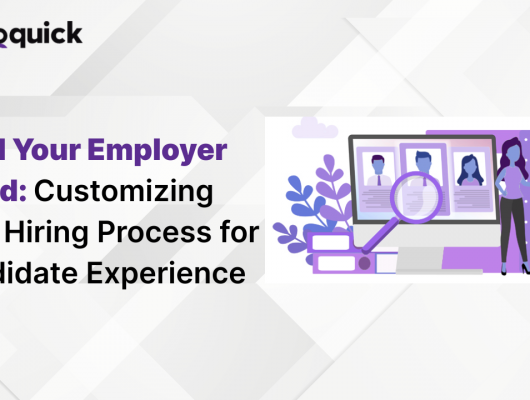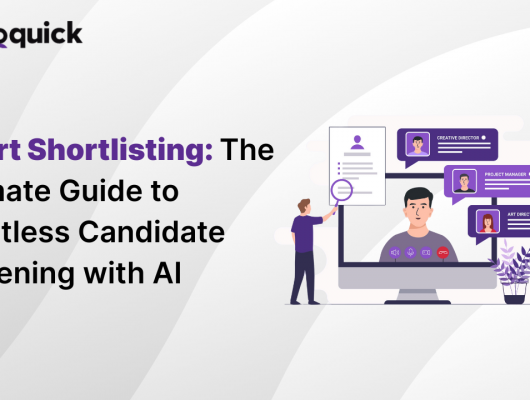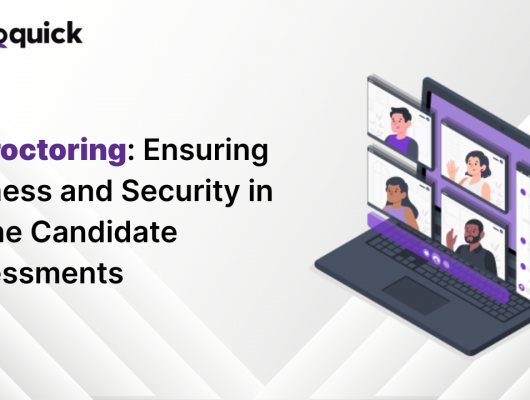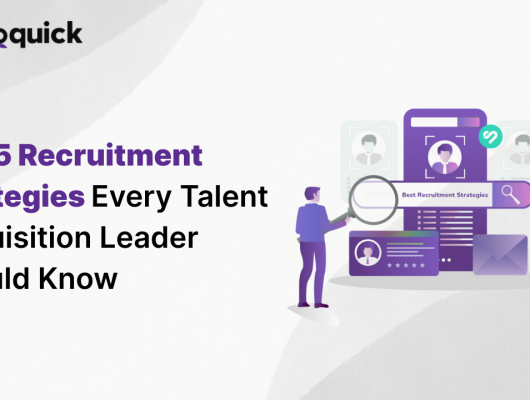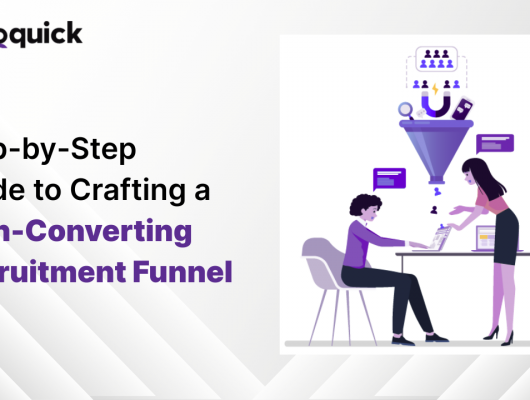You know, the world of recruiting lately? It just feels like it’s constantly changing. Honestly, recruiters today are dealing with so much – just mountains of applications, really tough competition for the best folks, everyone wants hires yesterday, and candidates expect, well, a really smooth experience, right? Doing things the old way, you know, all manual and taking ages, it’s just not really keeping up anymore. And that’s where AI, or Artificial Intelligence, really comes into the picture. It’s not like it’s going to take over completely, but it’s definitely becoming this incredibly helpful partner.
These AI-Powered Tools are genuinely changing how talent teams actually work. They handle the stuff that takes forever, give you insights from data you might miss otherwise, and can even spot candidates you wouldn’t have found. Embracing AI based recruitment tools? Yeah, that’s not some far-off future thing anymore; it’s kind of essential if you want to stay ahead. If you look at recent reports, you see investment in HR tech, including AI, is still climbing quite a bit because companies are seeing the impact, you know, on actually getting things done and doing it well. For instance, a SHRM article talks about these HR Tech trends:
What I wanted to do in this post is really get into five key kinds of Ai recruitment tools that, frankly, every recruiter these days probably should understand and maybe think about adding to their daily work. The whole idea is to give you the lowdown so you can use these technologies smartly, making your hiring process smoother, more accurate, and honestly, just a bit nicer for everyone involved.
Why AI is No Longer Just an Option
Okay, let’s be real. Finding great people in today’s market demands you be quick and insightful. If you’re just sticking to manual ways of doing things, it feels like you’re constantly hitting walls and you can’t really scale up. AI really helps tackle these basic limitations, and that’s why it feels like a crucial piece of any hiring plan that’s looking forward.
Boosting Efficiency & Speed
Time. It feels like recruiters never have enough of it. All those manual tasks – setting up interviews, sending out routine emails, wading through resumes initially? That eats up hours, maybe even days. AI takes care of that stuff automatically. And that, honestly, frees you up. You get to focus on the more important things, like actually talking to candidates and thinking strategically. The big win here is things just move faster overall, your time-to-hire shrinks.
Enhancing Candidate Quality
AI algorithms can look at huge amounts of data and start to see patterns that, you know, often point to candidates who are likely to do well. They don’t just look for keywords anymore; they can sort of understand skills and experience and maybe even get a sense of culture fit from the info available. What this means is you get better candidate lists right from the start. You spend less time wading through applications that aren’t a good fit and more time connecting with people who have real potential.
Improving Candidate Experience
Candidates now? They expect things to be fast and clear. AI tools, especially those little chatbot helpers, can give instant answers to common questions. They can walk candidates through the application process any time of day or night. Automated updates mean candidates aren’t left wondering. This kind of quick response just makes a really good impression, and honestly, it helps stop people from just dropping out of the process, which is good for your employer brand too.
Mitigating Unconscious Bias
Okay, this is a bit tricky, and it’s definitely not a perfect fix, but AI can be designed in a way that might help reduce unconscious bias in certain parts of the process. By looking just at objective criteria that are set up beforehand – stuff that ideally comes from what makes people successful in a role – AI screening could potentially offer a more consistent evaluation than a human might give without even realizing they’re doing it because of personal preferences. But you have to be super careful designing and constantly checking the AI to make sure it’s actually doing that. It’s not a guarantee, you know?
Data-Driven Decision Making
AI brings some really powerful ways to analyze things. It can track stuff like where your best candidates are coming from, where people are dropping out of the pipeline, and honestly, how long each step takes. This data is incredibly valuable; it shows you where things are getting stuck and where you could do better. Plus, predictive stuff can sometimes help you guess future hiring needs or potential problems down the road. Having these insights, backed by data, just helps you make smarter choices and shows everyone that what you’re doing is actually working.
The 5 Essential AI-Powered Tool Categories Every Recruiter Should Know
Understanding what the main types of AI based recruitment tools actually do helps you figure out where AI could make the biggest splash for whatever specific challenges you’re facing. These five areas are where AI is already making a real difference for lots of teams. Looking at Ai recruitment tools that fall into these categories is a good place to start if you want to change how you do things from start to finish.
So, here’s a quick look at these core areas:
| AI Tool Category | Primary Function | Key Benefit for Recruiters | Example Task Supported |
|---|---|---|---|
| AI-Powered Sourcing & Discovery | Finding potential candidates across platforms, basically. | Helps you look wider, finds people who aren’t actively looking. | Spotting folks online with those specific, hard-to-find skills. |
| AI-Powered Screening & Evaluation | Checking applications and assessments automatically. | Less time slogging through resumes, more consistent. | Ranking resumes based on, say, five key things you need. |
| AI-Powered Chatbots & Candidate Engagement | Talking to candidates automatically, which is nice. | Makes candidates happier, handles common questions any time. | Answering questions about benefits or where their application is. |
| AI-Powered Scheduling & Coordination | Setting up interviews automatically, thankfully. | Gets rid of the scheduling headache, speeds things up. | Finding times that work for you, the candidate, and three different interviewers. |
| AI-Powered Analytics & Prediction | Looking at all your hiring data to find patterns. | Helps you make decisions based on facts, maybe sees trends coming. | Showing you which job boards actually give you the best hires. |
1. AI-Powered Sourcing & Candidate Discovery Tools
Think of these as your digital explorers, really. AI based recruitment tools here are built to really dig through the huge online world – places like LinkedIn, social media, personal websites, public lists – to find potential candidates who look like they’d be a good match for what you need. They do way more than just simple keyword searches.
How they help recruiters: They use this smart technology, kind of like understanding context and learning from data, to figure out skills from text that isn’t perfectly structured. They can even try and predict if someone might be open to a new job, which is super helpful for finding people who aren’t actively applying – the passive candidates, you know? These tools can map out whole groups of talent and find people with really specialized or niche skills.
Benefits:
- Seriously cuts down on the time you spend manually searching.
- Finds candidates you probably wouldn’t stumble upon the old way.
- Helps you build a more varied pool of talent.
- Gives you insights into how many people with certain skills are in different areas.
Key features often include things like:
- Really advanced search capabilities that understand meaning.
- Connecting with lots of different online places.
- Pulling together candidate info automatically.
- Maybe even helping with that first message or getting in touch.
- Breaking down talent pools to analyze them.
Impact on workflow: You get lists of potential candidates who are already somewhat checked out, meaning you can jump right to talking to them instead of spending hours just looking for names. It changes the focus, really, from just finding people to actually building relationships.
2. AI-Powered Screening & Evaluation Tools
Once you’ve got people applying, sorting through everyone is crucial. These AI-Powered Tools basically automate that first filter. They look at incoming applications, resumes, cover letters, maybe even some initial online tests against the job description and whatever criteria you’ve set.
How they help recruiters: These AI programs can read thousands of resumes in minutes, pulling out skills, experience levels, education – the stuff you need – way faster and more consistently than, well, I could. Some fancier ones even look at video interviews for things like how clear someone is when they talk (though you have to be really careful ethically here, obviously). They give candidates a score based on how relevant they seem, helping you quickly see who looks most promising to look at more closely.
Benefits:
- Makes that first look through applications incredibly fast.
- Makes sure everyone is being looked at using the same set of rules.
- Helps lessen the chance of simple mistakes or that unconscious bias we talked about at the very first filtering step (again, gotta be designed right).
- Means you can spend your valuable time talking to people and really evaluating them, not just reading documents.
Key features often include:
- Solid resume reading and pulling out data.
- Matching skills and ranking against the job needs.
- Automatically scoring online tests.
- (Like I said, a bit controversial, but they exist) Analyzing cues in video/audio.
- Connecting with your main system for tracking candidates.
Impact on workflow: You get a list, often scored and ordered, of candidates who meet the basic stuff. This turns screening from that slow point into a much quicker part of the process, letting you move people along faster.
3. AI-Powered Chatbots & Candidate Engagement Tools
Keeping in touch is so important for a good candidate experience, but answering the same questions over and over? That takes up a ton of time. AI based recruitment tools here use technology that understands language to get what candidates are asking and give them instant, automated replies. They can talk through your careers site, text messages, whatever works.
How they help recruiters: Chatbots are basically your recruitment desk, open 24/7. They can answer common questions about jobs, what the company’s like, benefits, or how to apply. Some can even ask candidates a few initial questions to see if they’re eligible or grab some basic info. They can also just send automatic updates on where someone’s application is at.
Benefits:
- Gives candidates help right away, which makes people happier.
- Reduces how many standard questions you have to deal with personally.
- Keeps candidates feeling included while they’re waiting.
- Always available, which is great if you’re hiring people all over the place.
- Collects interesting data on what candidates are actually asking about.
Key features often include:
- Technology that understands what people mean when they type or speak.
- Working well with your career site and messaging apps.
- Being able to answer FAQs and follow a set flow of conversation.
- Grabbing contact info or asking those first screening questions.
- Sending automatic updates on application status.
Impact on workflow: You don’t have to spend time answering those basic, repeated questions anymore. You can focus on the conversations that need your human touch. And candidates have a better experience because they can get information easily and quickly.
4. AI-Powered Scheduling & Coordination Tools
Trying to set up interviews? It can feel like a total logistical nightmare, trying to match up multiple calendars, different time zones, everyone involved. Ai recruitment tools for scheduling just automate all that complex back-and-forth. They connect with calendars to find times that work for everyone – candidates and the interviewers.
How they help recruiters: These tools completely get rid of the endless emails you used to send trying to find a time that works. They send out calendar invites, confirmations, reminders – all automatically. If someone needs to reschedule? The AI can often handle that too, finding the next available slot based on everyone’s schedule.
Benefits:
- Saves so much administrative time, for you and the hiring managers.
- Makes the interview part of the process way faster, cutting down time-to-hire.
- Helps stop those annoying scheduling mistakes.
- Just feels professional and smooth for the candidate.
- More people actually show up for interviews because they get reminders.
Key features often include:
- Connecting with major calendar systems (like Google or Outlook).
- Automatically finding open times.
- Sending out personalized calendar invites and confirming details.
- Automated reminders before the interview.
- Handling reschedule requests efficiently.
Impact on workflow: That huge task of scheduling interviews? It’s dramatically reduced, or maybe even gone. You can book interviews much faster, keeping things moving quickly and making the whole journey better for the candidate. This, right here, is a fantastic example of recruitment automation working well.
5. AI-Powered Analytics & Prediction Tools
To get better at hiring, you really need to understand what’s happening, and that comes from data. These AI-Powered Tools look at all the information your hiring process generates. They spot trends, measure how well things are working, and use learning models to try and predict what might happen in the future.
How they help recruiters: AI analytics can show you which places you’re finding candidates actually bring in the best people, where candidates are dropping off in the process, and how long each step usually takes. Predictive models might forecast your future hiring needs based on business growth or even guess which candidates are most likely to say yes to an offer or do well in the job.
Benefits:
- Gives you deep, data-backed insights into whether your hiring strategy is actually effective.
- Shows you where things are getting stuck or aren’t working efficiently.
- Helps you decide where to spend your money on sourcing and recruiting.
- Allows for much more accurate planning for future hiring (predictive hiring).
- Helps you show the higher-ups that your efforts are actually providing value.
Key features often include:
- Dashboards and visuals you can customize to see key numbers (like time-to-hire, cost-per-hire, which sources work best).
- Seeing exactly where candidates are in the process and when they drop off.
- Models that try to predict candidate success, offer acceptance, or how long it will take to fill a role.
- Looking at how recruiters on the team are performing.
- Creating reports for managers or executives.
Impact on workflow: Instead of just reacting to things, you and your HR leadership can actually make decisions based on real information. You can constantly tweak your process using hard data, plan for future needs more accurately, and put money into the areas that actually give you the best results.
Beyond the Big 5: Other Emerging AI Applications in Recruitment
Okay, so while those five areas are probably where AI is making the biggest splash for most recruiters right now, how AI is being used in hiring is honestly just growing all the time. It feels like AI has the potential to touch pretty much every single step of an employee’s time with a company.
Some other things that are starting to pop up or are worth keeping an eye on include:
- AI in Onboarding: Chatbots helping new employees with those first questions or showing them where things are.
- Internal Mobility Prediction: Looking at employee info to figure out who might be ready for a move or a promotion inside the company.
- Employee Retention Analytics: Using AI to spot reasons why people might leave and maybe predict who’s at risk.
- Compensation Analysis: Using AI to look at market data and help make sure your pay offers are competitive.
These examples just highlight how AI isn’t just about bringing people in; it can also help with managing, growing, and keeping employees. It really shows the bigger picture potential of AI in hiring and HR generally.
Choosing the Right AI-Powered Tools for Your Team
Thinking about bringing in AI-Powered Tools? You really need to put some thought into it. It’s not just about getting AI because it’s the trendy thing; it’s about actually fixing problems and making your process better. Picking the right tools is key to actually using them successfully and seeing a real return on your investment.

Assessing Your Specific Needs & Pain Points
Honestly, start by figuring out what the biggest headaches are in your current hiring process. Is it finding those really niche candidates? Drowning in applications? Wrestling with scheduling? Are candidates always asking the same things? Can you actually see what your data is telling you? Knowing exactly what problems you want to solve first will help you decide which AI tools make the most sense to look at.
Evaluating Tool Capabilities & Features
Once you have a sense of what you need, really take a good look at the tools out there. Do they actually do what you need them to? Are they sophisticated enough for your situation? Ask for demos, maybe even trials if you can. Try using them with your own data or typical scenarios if possible. Don’t get distracted by flashy features that sound cool but you’ll probably never use, you know?
Considering Integration with Existing Systems
This is non-negotiable, honestly, for things to work smoothly. You have to make sure any new AI based recruitment tool can easily connect with your current Applicant Tracking System (ATS), your HR system (HRIS), your calendar apps, anything else important. If you have to manually move data around, it kind of defeats the whole purpose of automating, and you’re just asking for mistakes.
Understanding Data Security & Privacy
You’re handling really sensitive information about candidates. It is absolutely, 100% critical to know how the vendor for the AI tool handles data security and privacy. Make sure they follow all the necessary rules and regulations, like GDPR or CCPA, and any specific to your industry. Ask them directly about how they store data, what security they have, and how long they keep information. This isn’t something to overlook.
Budget and ROI
Okay, AI tools are an investment, no doubt. Think about the cost – the setup fees, the monthly or yearly payments, maybe training people. But also, try and figure out what you might get back. How much time will it save? How might it help you hire better people or faster? Put numbers on the benefits if you can; it helps when you need to explain why you need to spend the money.
Vendor Support & Implementation
Getting new technology up and running can be complicated, let’s face it. See what kind of support the vendor offers. Do they help you get started and trained? What kind of technical help is there if things go wrong? Having a vendor who’s actually helpful is really important for things to go smoothly and work out in the long run.
Addressing Bias & Fairness
Because of the potential for AI to be biased, you really have to look closely at how the tool deals with this. Does the vendor have clear ways of checking their AI for bias? Understand how the tool makes its decisions and where a human person still needs to be involved. Plan out how your team will use the tool responsibly to try and make sure things are fair for everyone.
Implementing AI Tools Effectively in Your Recruitment Workflow
So, you’ve got the Ai recruitment tools? Great! But that’s just the beginning. For them to actually work well, you need to implement them carefully and help your team adjust. Just handing people new tech without a plan often just leads to frustration and honestly, the tools probably won’t get used properly.
Starting Small: Piloting AI Solutions
Don’t try and change everything at once, okay? Maybe start with just one tool, or try it out in just one specific part of your hiring process first. This lets you see how the tool works in the real world, get feedback from the recruiters actually using it, spot any unexpected issues, and hopefully show that it works on a smaller scale before you roll it out everywhere.
Change Management & Team Training
Let’s be honest, recruiters might feel a bit unsure about AI at first. Talk about their concerns openly. Make it clear that AI is there to help them, not replace them. Give them good training on how to use the new tool and how it actually fits into what they do every day. Make sure they see the benefits for them – less grunt work, more time to connect with candidates, stuff like that.
Defining Success Metrics
Before you even start using it, decide exactly how you’ll know if the tool is working. What will you measure? Maybe it’s cutting down the time spent on a specific task (like scheduling interviews), seeing more candidates respond, getting a higher percentage of qualified applicants, or maybe a faster time-to-hire for the roles you’re testing it on. Track these things before and after you put the tool in place.
Continuous Monitoring & Improvement
Getting AI is not like buying a piece of furniture; you can’t just place it and forget about it. Keep an eye on how the tool is performing and what it’s doing to your process. Keep asking your team for feedback. AI often needs ongoing training and tweaks. Be ready to change how you use the tool and work with the vendor to make sure it keeps getting better over time.
Addressing the Concerns: Challenges and Ethical Considerations of AI in Recruitment
While there are so many good things about AI-Powered Tools, it’s really important to also think about and deal with the potential challenges and ethical stuff. Using AI responsibly is the key to getting the most out of it while reducing the downsides.
The Risk of Algorithmic Bias
This is probably the biggest worry for most people, right? AI learns from the data it’s trained on. If that data from past hiring already has biases in it (like, maybe it historically favored certain groups or backgrounds), the AI could end up repeating or even making those biases worse in its decisions. This could lead to unfair results and frankly, a less diverse team. You have to be really careful, pick your data wisely, use tools that detect bias, and check things regularly.
Data Privacy and Security
Hiring involves collecting a lot of personal information from people. Using AI based recruitment tools just adds more layers to this. Making sure that data is secure and private is absolutely non-negotiable. Recruiters and HR teams need to feel really confident that the tools they’re using follow all the right data protection laws and have strong security in place to stop any breaches.
The Need for Human Oversight
Think of AI as a very smart helper, not someone making decisions all by themselves. Things like human judgment, empathy, intuition, and being able to actually build a connection with someone are still incredibly important for good hiring. AI can give you insights and do the repetitive stuff, but the final decisions about who to hire should really involve human review and interaction. Just relying on AI alone could mean you miss out on great people or make the whole experience feel cold and impersonal.
Integration Complexity and Cost
Getting new AI tools to work with older systems you already have can sometimes be a real headache and honestly, expensive. Making sure data moves smoothly between all your systems is crucial. While AI promises to make things more efficient, the initial money you put into the tool, getting it set up, and training everyone needs to be planned and budgeted for carefully.
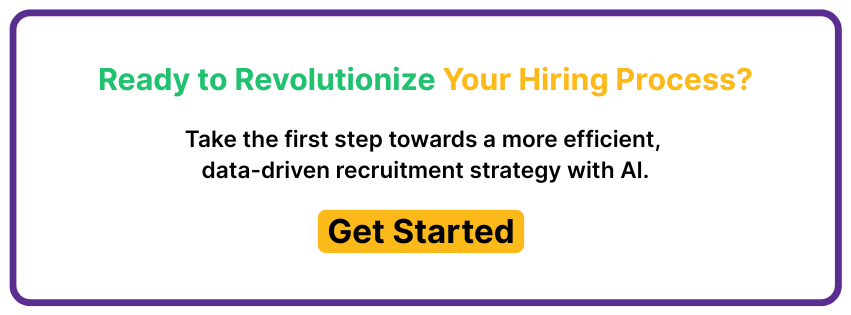
The Future is Now: How HireOquick Leverages AI to Empower Recruiters
Here at HireOquick, we really get how much AI can change things for the better, making hiring more efficient and effective. We’ve built AI capabilities right into our platform so recruiters have the tools they actually need to handle what modern recruiting throws at them. Our aim is pretty simple: take away the boring, repetitive tasks, give you valuable insights, and free up recruiters so they can focus on, you know, the human side of hiring.
HireOquick has a few different AI-Powered Tools baked in to help boost your recruitment efforts:
- AI Proctoring: Helps make sure online tests are fair and honest.
- Resume Parsing: Pulls out the key info from resumes really efficiently and puts it right into candidate profiles.
- AI-Powered Assessment Generation: Helps you put together relevant questions for tests based on the job and the skills needed.
- AI-Powered Skills Generation: Assists in figuring out and listing the core skills you really need for a position, making job descriptions more accurate and finding better candidate matches.
- AI-Powered Job Description Generation: Gives you a helpful starting point for writing job descriptions that are clear and engaging.
These features are all integrated and, combined with HireOquick’s other stuff like managing candidates, letting you brand things your way, and detailed reports, they offer one place where a lot of the benefits of the AI recruitment tools we talked about come together. HireOquick is really aiming to be that solution that simplifies those complicated hiring processes and makes your team more capable.
Conclusion: Embrace AI to Build a Better Hiring Process
The hiring world will absolutely keep changing, but one thing seems pretty clear: AI isn’t going anywhere and it’s going to become even more important. Those five kinds of AI-Powered Tools we discussed – for Finding people, Screening, Talking to candidates, Scheduling, and looking at your Data – are huge opportunities for recruiters today. They really offer the chance to make things way more efficient, improve the quality of candidates, make the experience better for everyone applying, and genuinely make decisions based on what the data tells you.
Getting on board with AI based recruitment tools isn’t about getting rid of the human part; it’s about making it stronger. It’s about letting the AI handle the stuff that takes up your time so recruiters can actually focus on thinking strategically, building those important relationships, and making thoughtful decisions about who to hire. By really thinking about which Ai recruitment tools you choose, how you use them, making sure you address the ethical stuff, and training your team properly, you can build a hiring process that’s not just quicker and saves money, but is also fairer and just a better experience for everyone involved.
Honestly, the future of recruiting feels smart, more automated in the right places, and still very much focused on people, all thanks to using AI the right way. It’s definitely worth exploring how these tools could fit into what you do and maybe unlock a whole new level of mastering hiring.
Want to learn more about how HireOquick’s AI features can make your hiring process smoother? Learn more about HireOquick’s AI features.
Or maybe Request a Demo to see HireOquick live? [Internal Link: HireOquick Demo Request Page].
You could also Subscribe to the HireOquick blog for more thoughts on where recruitment tech is heading.
FAQs about AI in Recruitment
Will AI Replace Recruiters?
No, not really. Most people don’t expect AI to completely take over from recruiters. AI tools are great for automating repetitive stuff and giving you data insights, but the human skills – like empathy, building connections, negotiating, strategic thinking – are still super important. Think of AI more as a really powerful helper that gives recruiters more time to focus on the parts of the job that really need a human touch.
How Can I Ensure AI Tools Aren’t Biased?
Making sure things are fair takes effort. You need to ask vendors about how they try to avoid bias, where the data they used to train the AI came from, and how they check for bias regularly. Keep an eye on the results and outcomes from the AI yourself for any signs of bias. Always use AI insights alongside human review, especially when you’re making big decisions. It requires vigilance, honestly.
How Much Do AI Recruitment Tools Cost?
The price can vary a lot, totally depending on what the tool does, who makes it, how much you’ll use it, and if it needs to connect with other systems. It could be anything from a subscription fee for just one tool to a pretty big investment for a whole platform. You really need to look at what you might get back from it and plan your budget accordingly.
What’s the First AI Tool a Recruiter Should Consider?
That really depends on what your biggest pain point is right now. If you’re drowning in applications, maybe an AI screening tool is the way to go. And if scheduling is driving you crazy, look at an AI scheduler. If candidates aren’t getting enough attention, a chatbot might be helpful. Start with whatever area causes the most immediate problems and where automating things would give you the clearest benefit.
Is My Data Safe with AI Recruitment Tools?
Data security and privacy are huge things to think about. You need to really vet potential vendors carefully regarding how they handle data, if they follow rules like GDPR, and what kind of security they have. Choose vendors with good reputations and very clear policies about data privacy. Always know where your data is being kept and how they’re protecting it.

